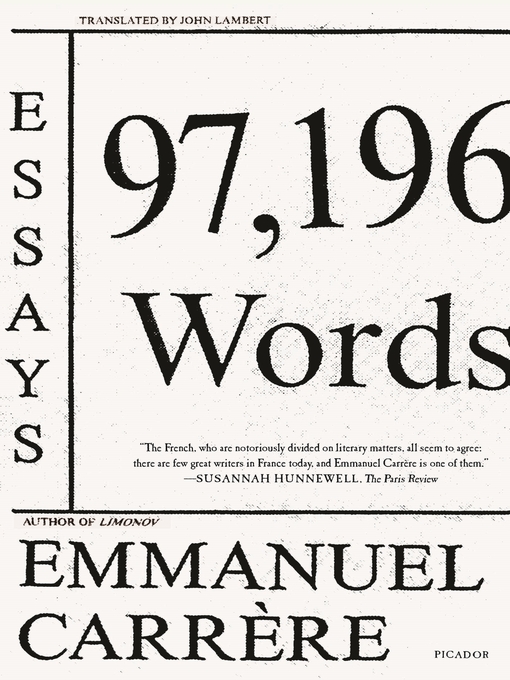A selection of the best short work by France's greatest living nonfiction writer
A New York Times Notable Books of 2020
No one writes nonfiction like Emmanuel Carrère. Although he takes cues from such literary heroes as Truman Capote and Janet Malcolm, Carrère has, over the course of his career, reinvented the form in a search for truth in all its guises. Dispensing with the rules of genre, he takes what he needs from every available form or discipline—be it theology, historiography, fiction, reportage, or memoir—and fuses it under the pressure of an inimitable combination of passion, curiosity, intellect, and wit. With an oeuvre unique in world literature for its blend of empathy and playfulness, Carrère stands as one of our most distinctive and important literary voices.
97,196 Words introduces Carrère's shorter works to an English-language audience. Featuring more than thirty extraordinary essays written over an illustrious twenty-five-year period of Carrère's creative life, this collection shows an exceptional mind at work. Spanning continents, histories, and personal relationships, and treating everything from American heroin addicts to the writing of In Cold Blood, from the philosophy of Philip K. Dick to a single haunting sentence in a minor story by H. P. Lovecraft, from Carrère's own botched interview with Catherine Deneuve to the week he spent following the future French president Emmanuel Macron, 97,196 Words considers the divides between truth, reality, and our shared humanity as it explores remarkable events and eccentric lives, including Carrère's own.
- Audiobooks: New Horror
- Audiobooks: Recent Biographies
- Audiobooks: Contemporary Romance
- Audiobooks: Listen to an Adventure
- Audiobooks: Celebrity Book Club Picks
- Audiobooks: Thrillers
- Audiobooks: Make Them Laugh
- Audiobooks: Listen and Learn
- Audiobooks: New Year New You
- Audiobooks: Holiday Romance
- Audiobooks: Cozy Female Sleuths
- New audiobook additions
- New kids and teen additions
- See all audiobooks collections
- Just added
- Kids' Magazines
- Teen Magazines
- Florida Magazines
- Magazines from India
- Learn, Make and Create - Magazines
- Travel Magazines
- Sports
- Health & Fitness
- Most popular
- Cooking & Food
- Celebrity Gossip
- News & Politics
- See all magazines collections

